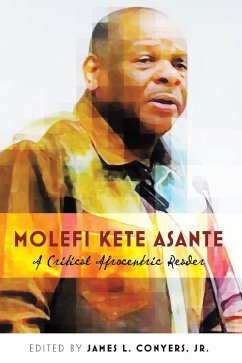Conceptually, Molefi Kete Asante: A Critical Afrocentric Reader is a reflexive analysis of the editor's space in higher education over the past three decades. As a historical assessment, this reader is a narrative that offers a constructive perspective of Afrocentricity, as the sheer mention of the word draws reaction and fear from either uniformed or conventional personnel. The book organizes Asante's writings into four categories: history, mythology, ethos, and motif. Arranged theoretically, these are the four concepts that describe and evaluate culture from an Afrocentric perspective. This study offers an assessment of Asante's body of literature that continues to position the philosophy and ideals of the Afrocentric movement internationally. In the context of being a public intellectual, the core of Asante's analysis draws inferences in locating Africana occurrences in place, space, and time. Advancing this idea further, the purpose of these presages is to motivate scholars in the field of Africana studies to contribute to the intellectual history of W. E. B. Du Bois, Maria Stewart, Carter G. Woodson, John Henrik Clarke, and the countless others who have advanced Africana research and writing. For many cynics and associates, the scholarship of Asante has not been thoroughly vetted. Directly or indirectly, Asante offers a foundation of optimism in forming the outliers of breakdown and breakthroughs for victorious thought of an Afrocentric perspective.
Dieser Download kann aus rechtlichen Gründen nur mit Rechnungsadresse in A, D ausgeliefert werden.
"This important collection has great potential for mitigating the widespread misunderstanding of the construct of 'Afrocentricity,' as advanced by Molefi Kete Asante. Much of the criticism leveled at Asante fails to understand, as he appropriately reminds readers, that Afrocentricity is articulated as 'the ideological centerpiece of human regeneration, systematizing our history and experience with our own culture at the core of existence.' Building on intellectual insights of Cheikh Anta Diop, Asante has not only weathered the heavy criticism, he has produced a remarkable volume of scholarship that explicates and extends his initial formulations. The selections in this volume provide readers, and especially serious students of Africana Studies, with a unique opportunity to follow the trajectory of Asante's intellectual explorations, and also to better understand the ideology and values that catalyzed the formation of the discipline." James B. Stewart, Professor Emeritus, Penn State University


